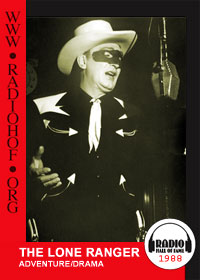

It ran from 1934 to 1954 but I was a listener in 19. Let’s Pretend, billed as “radio’s outstanding children’s theater,” was broadcast on Saturday mornings and featured stories taken from old fairy tales, played out by child actors, from the brothers Grimm and the Arabian Nights. It didn’t matter what people looked like or what they wore. And contrary to TV, there is something egalitarian about a medium in which voice, coupled with your imagination to make of it what you will, is king. Suddenly all of us could enjoy performances once reserved for privileged live audiences in a theater. Radio’s democratic spirit marked a revolutionary leap from all that had come before it. His powerful voice, whose immediacy I still feel all these years later, was the voice we all came to associate with the Lone Ranger, until the 1954 demise of the series. When he recovered a new actor, Brace Beemer, had taken over the role.


For several programs the storyline was that the Lone Ranger was critically ill and unable to speak above a whisper. The death left us children consumed with curiosity-what would happen to our radio hero? For weeks we tuned in to find out. The news did not end our fascination with the radio. The actor who played our hero had fallen asleep at the wheel of his auto and died in the ensuing crash. Then one evening father looked up from his newspaper and told us of a disconcerting news item he’d just read. From out of the past come the thundering hoofs of the great horse Silver! The Lone Ranger rides again!”

Return with us now to those thrilling days of yesteryear. Nowhere in the pages of history can one find a greater champion of justice. “A fiery horse with the speed of light, a cloud of dust and a hearty Hi-Yo Silver! The Lone Ranger! With his faithful Indian companion, Tonto, the daring and resourceful masked ride of the plains led the fight for law and order in the early western United States. When I was a child in the Los Angeles of the 1930s, our family never missed a broadcast of The Lone Ranger, and the introduction, always accompanied by Rossini’s William Tell Overture, is still fixed in my mind. Was there ever anything more visceral than the radio of the early 20th century? The digital age, we are told, has made media more immediate, more democratic, more visceral than what came before.


 0 kommentar(er)
0 kommentar(er)
